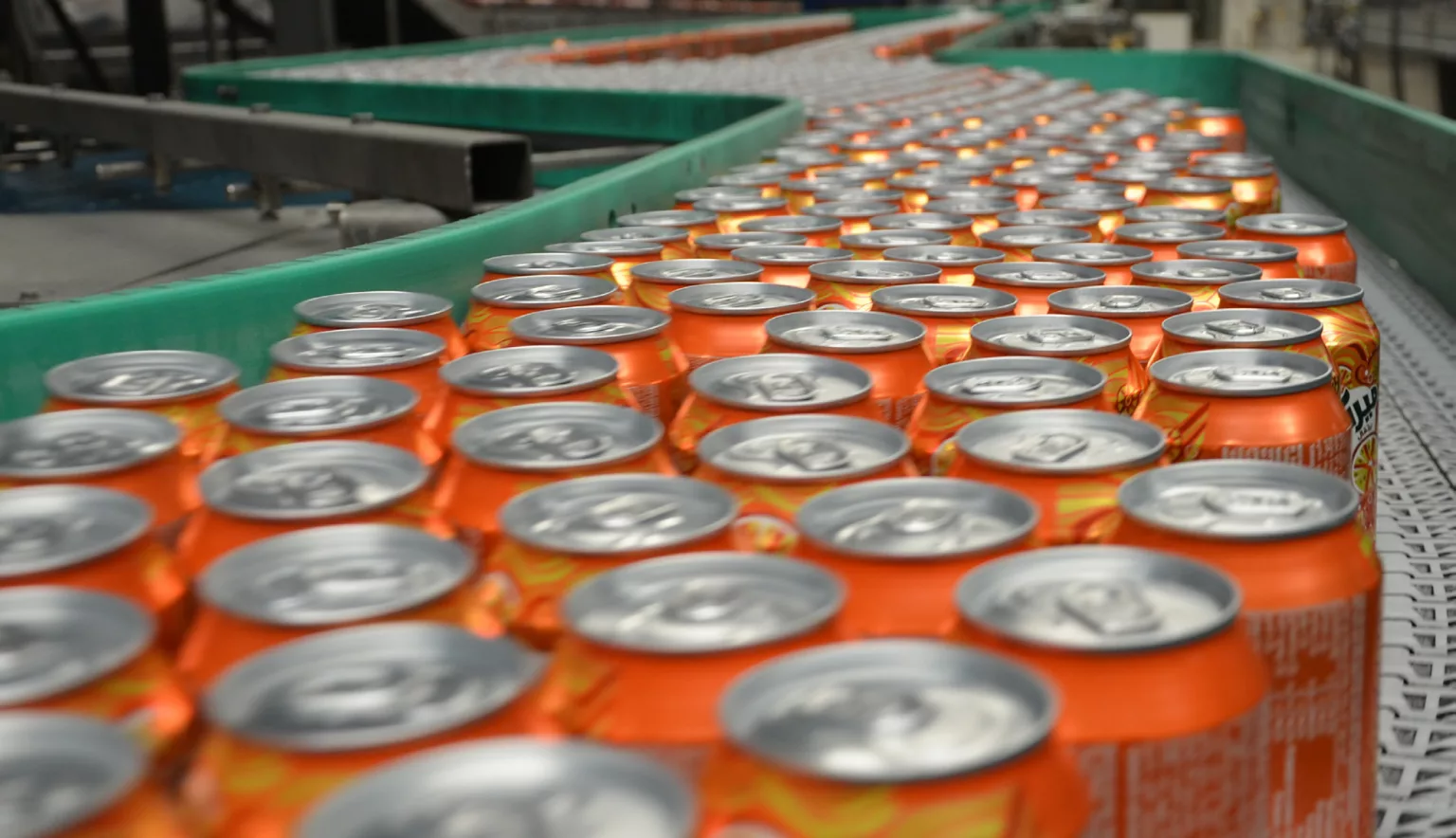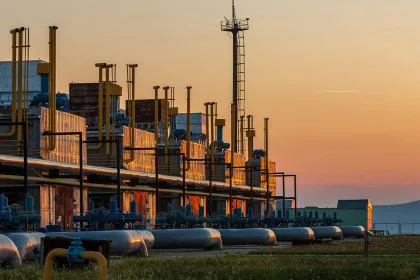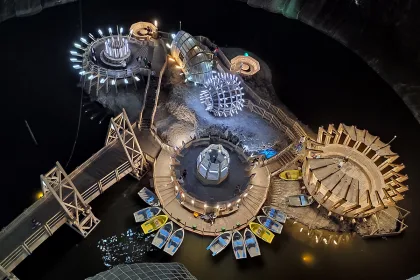Operating in a complex food and beverage market, industry veteran Dubai Refreshment PJSC is responding to challenges and opportunities by diversifying its product portfolio.
A REFRESHED APPROACH
The UAE’s food and drink industry is in a stable state.
Home to several longstanding and successful enterprises, the sector represents one of if not the most important manufacturing segments contributing to the nation’s economy, an economy which the government is determined to further diversify outside of oil.
And it appears to be doing a commendable job. In 2017 the BMI Risk/Reward index ranked the UAE as the most favourable environment in the GCC for the food and drink trade, and fourth most attractive globally.
Further research suggests the industry will reach $196 billion in 2021, up from $130 billion recorded in 2018, with subsectors such as non-alcoholic beverages among those tipped for solid growth.
Indeed, this market is tipped to expand by an annual rate of around 5.9 percent thanks to the popularity of products including fruit and vegetable juices, soft drinks, mineral water and spring water.
For F&B manufacturing and distribution specialist Dubai Refreshment PJSC (DRC), today’s dynamic backdrop offers tremendous potential to grow both its core and supplementary lines of business, building on a legacy stretching back 60 years.
“The fact I am working for a company with such an extensive legacy fills me with great pride,” comments Chief Operations Officer Sherif Elmeligy.
“We are very well-known to the local communities here in Dubai who will know DRC for its factory that was a landmark on Sheikh Zayed Road for over 40 years. It was on the outskirts when it was built and now it lies in the centre of Dubai.”
Elmeligy’s journey to the emirate is a somewhat unconventional one, the Egyptian starting his career in finance before moving into the drinks business and working in Saudi Arabia, Ghana, Algeria and back home in Egypt, the switch in industry triggered by a desire to be operating at the frontline of business.
“It has been a series of life experiences being able to meet and interact with different cultures and societies,” he adds, recalling how he was approached by DRC while he was on a business trip in Thailand back in 2012, the move to Dubai coinciding with the instability surrounding the aftermath of the Arab Spring.
MOVING WITH THE TIMES
An immediate task was to help steer and realise the plans of Dubai Refreshment PJSC to build a new, state-of-the-art manufacturing base.
Though iconic, the site on Sheikh Zayed Road had its limitations, so the long-term decision was made to develop a facility fit for the future.
“The entire process, from planning through to construction and operation, took four to five years, and now it is one of the biggest soft drink manufacturing facilities in the lower Gulf,” Elmeligy says.
“We have the capability to produce three different beverage categories – carbonated soft drinks, iced tea and purified water. This translates into a current capacity of around 60 million cases – however, the infrastructure can accommodate 120 million cases by adding more lines and vertically expanding our storage, meaning we have catered for the long-term expansion of the company.”
This is where Wael Nehme, VP of Supply Chain & Projects, enters the conversation.
“Our lines have been selected from the top manufacturers – several from Germany and another from France,” he explains.
“They are all automated with minimum need for human intervention and operate with extremely high efficiencies and output. The machines are also flexible in that they can produce various pack sizes and shapes.”
Nehme’s remarks are backed up by some striking figures. In operation since 2016, the new facility is able to manufacture up to 180,000 cans per hour, 80,000 plastic bottles per hour and 24,000 glass bottles per hour, with room to add another five lines.
Nehme continues: “In terms of our warehouse, current storage height is around 14 metres, but we can go to a high bay warehousing system as high as 37 metres in one area, which allows us to introduce further capacity.”
For Elmeligy, the new site combined with the company’s established reputation with large brands is what differentiates it in a competitive marketplace.
“For example, we have a strong local share in PepsiCo’s Mountain Dew, which equates to around 30 percent of our business at the moment,” he adds. “In terms of the citrus segment generally, our share is much higher than any other competitor, which is a large portion of the UAE’s soft drinks industry.”
Such partnerships translate into an impressive company reach which is served by its in-house distribution operation.
The company sells to around 16,000 outlets, with around 95 percent of orders being fulfilled by DRC’s own transport fleet, another facet of the business which enables seamless integration of further product verticals.
This element of control from start to finish results in what Elmeligy describes as a superior customer service, the addition of technology to the distribution operation helping to provide real-time information on orders and enabling clients to order via web-based applications.
SAFEGUARDING THE FUTURE
While the newly-expanded production and distribution numbers are cause for optimism, Nehme is quick to add another important factor behind recent investments of Dubai Refreshment PJSC.
“This new, larger facility hasn’t just been about expansion,” he says. “We have also added new capabilities such as the Lipton Ice Tea and Aquafina bottled water, and we are continuing to diversify our portfolio.”
Such a move, while strategically a natural one, has been necessitated by the introduction of a recent 50 percent excise tax on carbonated soft drinks by the UAE government.
But while the levy presented an obstacle in the form of reduced sales, DRC has embraced new partnerships which are helping to expand the non-carbonated soft drinks portfolio, which currently accounts for around 10 percent of business.
For example, it now operates a franchise of the Egyptian FMCG company Edita, specifically importing wafers and cakes. Another local franchise that Dubai Refreshment PJSC acquired is Snack Time, an agreement which sees the company distribute its croissants and Rusks range. These are in addition to distribution rights for Robinsons and Tesseire.
This is not to suggest that the core business is not subject to development, however, as another new collaboration will see the company bottle and distribute premium mixers in the future.
“Our strength in the market has without doubt helped us to acquire these new lines of business, and given our capabilities we knew that diversifying was a natural option for us,” comments Elmeligy.
Diversification has also occurred in relation to DRC’s power supply, another move which is helping to safeguard the company’s long-term, sustainable future.
“Last March we installed the largest rooftop solar integration in the UAE,” says Nehme.
“It is around 50,000 square metres in size and contains 11,000 PV solar panels, a huge increase on our previous installation which we used to heat water. Now we can cover up to a third of our electricity demand using solar, which amounts to around five to six million kilowatt hours per year.”
This equates to an impressive annual carbon dioxide saving of 4,000 tonnes, while other plant efficiencies brought about by new machinery are estimated to be saving a further 1,500 tonnes a year. Another important initiative involves ramping up the recycling of wastewater, while further environmental and financial saving are being made thanks to investment in wastewater treatment.
“We have a plant which has a capacity of 1,300 cubic metres per day,” Nehme continues. “At the moment we only use around 600 cubic metres, so we have room to expand this as we add more production lines to the business.
Half of the treated water is used for irrigation and truck washing, and the other 50 percent is sent to companies involved in industrial sectors like construction.
“The benefits of this are two-fold,” Nehme adds. “Clearly, it is more sustainable for the environment, but is also helping Dubai Refreshment PJSC financially by saving on costs such as drainage fees and water bills.”
These strategic investments leave the leadership duo in an optimistic mood, the conversation ending with a look into the future priorities of the business.
Coming back to the importance of diversification, Elmeligy concludes: “The main priority is to increase the size of our non-traditional product categories to have a fair balance within our portfolio. It is important not to rely too heavily on one product line, so by growing in several areas we can safeguard against any unforeseen challenges.
“Since October 2017, carbonated soft drinks have been imposed with strict taxation measures which has resulted in a decrease in transactions, but we have responded to the challenges, stabilised the situation through a combination of sales improvement and cost reduction initiatives, and we have strengthened in other areas. This will always be a crucial segment to us, but our future is a multifaceted one.”
Editor’s note: Many of the business leaders featured by EME Outlook continue sharing their insights on LinkedIn. For CEO’s across EME seeking to strengthen their online presence, visit LinkedIn for CEO’s.































